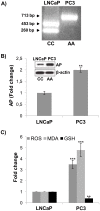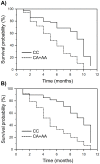Glyoxalase 1-419C>A variant is associated with oxidative stress: implications in prostate cancer progression
- PMID: 24040147
- PMCID: PMC3769356
- DOI: 10.1371/journal.pone.0074014
Glyoxalase 1-419C>A variant is associated with oxidative stress: implications in prostate cancer progression
Abstract
Glyoxalase 1 is a scavenging enzyme of potent precursors in reactive oxygen species formation and is involved in the occurrence and progression of human malignancies. Glyoxalase I A111E polymorphism has been suggested to influence its enzymatic activity. The present study was aimed at investigating the association of this polymorphism with oxidative stress and its implications in prostate cancer progression or survival. The polymorphism was genotyped in human differently aggressive and invasive prostate cancer cell lines, in 571 prostate cancer or 588 benign prostatic hyperplasia patients, and 580 healthy subjects by Polymerase Chain Reaction/Restriction Fragment Length Polymorphism. Glyoxalase 1 activity, the pro-oxidant Glyoxalase 1-related Argpyrimidine and oxidative stress biomarkers were evaluated by biochemical analyses. Glyoxalase 1 polymorphism was associated with an increase in Glyoxalase 1-related pro-oxidant Argpyrimidine and oxidative stress levels and cancer progression. The mutant A allele conferred a modest risk of prostate cancer, a marked risk of prostate cancer progression and a lower survival time, compared to the wild C allele. The results of our exploratory study point out a significant role for Glyoxalase 1 in prostate cancer progression, providing an additional candidate for risk assessment in prostate cancer patients and an independent prognostic factor for survival. Finally, we provided evidence of the biological plausibility of Glyoxalase 1 polymorphism, either alone or in combination with other ones, all related to oxidative stress control that represents a key event in PCa development and progression.
Conflict of interest statement
Figures


References
-
- Rabbani N, Thornalley PJ (2012) Methylglyoxal, glyoxalase 1 and the dicarbonyl proteome. Amino Acids 42: 1133–1142. - PubMed
-
- Thornalley PJ, Rabbani N (2011) Glyoxalase in tumorigenesis and multidrug resistance. Semin Cell Dev Biol 22: 318–325. - PubMed
-
- Kim KM, Kim YS, Jung DH, Lee J, Kim JS (2012b) Increased glyoxalase I levels inhibit accumulation of oxidative stress and an advanced glycation end product in mouse mesangial cells cultured in high glucose. Experimental Cell Research 318: 152–159. - PubMed
-
- Desai KM, Chang T, Wang H, Banigesh A, Dhar A, et al. (2010) Oxidative stress and aging: is methylglyoxal the hidden enemy? Can J Physiol Pharmacol 88: 273–284. - PubMed
MeSH terms
Substances
LinkOut - more resources
Full Text Sources
Other Literature Sources
Medical
Molecular Biology Databases
Research Materials
Miscellaneous

